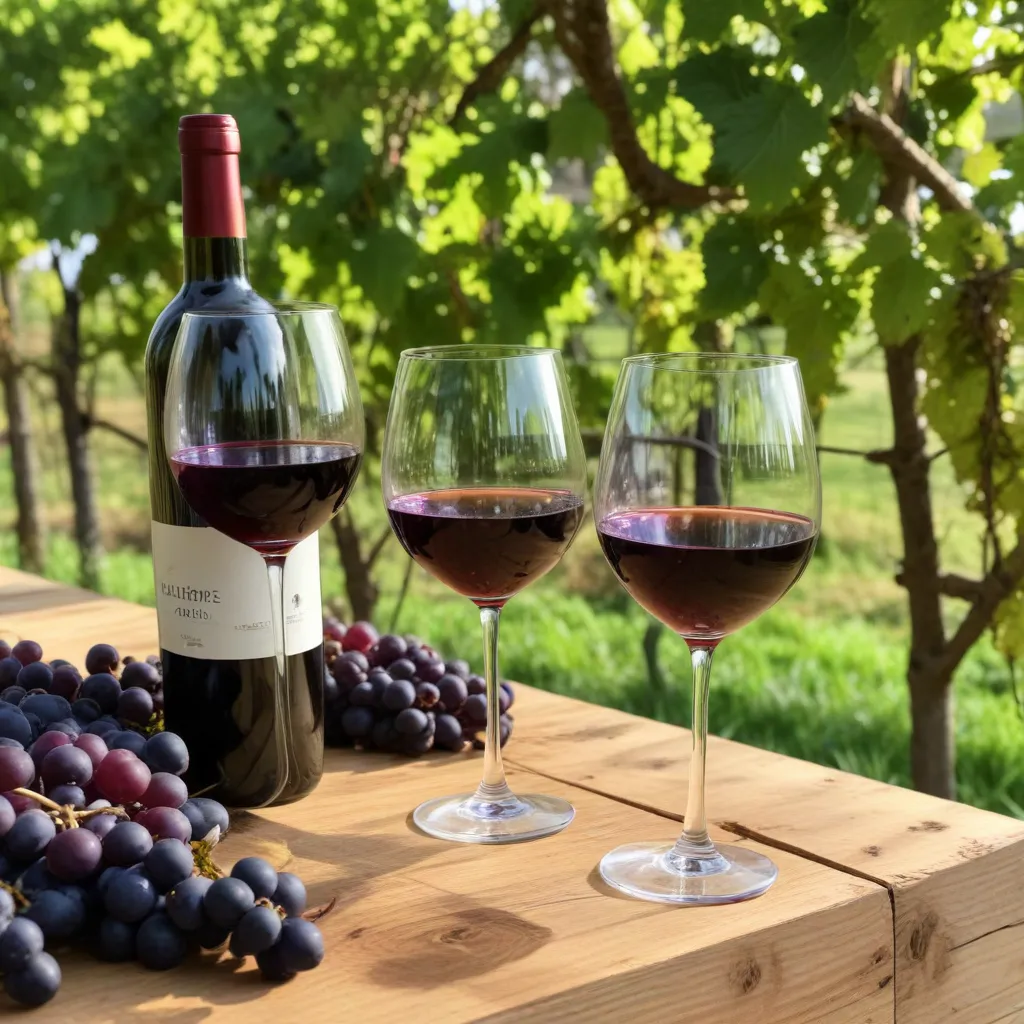
Sustainable Sipping: Exploring Organic and Biodynamic Wine Options
As a hospitality and wine expert writing for the Wine Garden Inn, I’m excited to guide you through the world of sustainable wine options that are not only delicious but also better for the environment. In this article, we’ll dive deep into the nuances of organic and biodynamic winemaking, exploring their distinct principles, certification standards, and the growing consumer demand for eco-conscious vintages.
Organic Wine Fundamentals
At the heart of organic winemaking are the principles of sustainable viticulture. Organic vineyards eschew the use of synthetic pesticides, herbicides, and fertilizers, opting instead for natural alternatives like compost, green manure, and biological pest control. This approach not only promotes biodiversity and soil health but also creates a more resilient ecosystem in the vineyard.
To be officially recognized as “organic,” wines must meet strict certification standards set by regulatory bodies, such as the USDA’s National Organic Program in the United States or the European Union’s organic regulations. These standards encompass every aspect of the winemaking process, from the grapes themselves to the additives and processing aids used in the cellar.
The benefits of organic wine production go far beyond the vineyard. By eliminating synthetic chemicals, organic wines reduce pollution and conserve natural resources, making them a more environmentally responsible choice. Additionally, organic wines often have fewer additives and lower levels of sulfites, which can potentially reduce the risk of headaches and allergic reactions for some consumers.
Biodynamic Wine Principles
While organic winemaking focuses on the exclusion of synthetic inputs, biodynamic viticulture takes a more holistic approach, rooted in the principles of biodynamics. Biodynamic farmers view the vineyard as a self-sustaining, interconnected ecosystem, and they employ a range of specialized practices to enhance the overall health and balance of the system.
At the core of biodynamic farming are the use of specific compost preparations and the adherence to the lunar calendar. Biodynamic growers meticulously time their vineyard activities, from pruning to harvesting, based on the rhythms of the moon and the position of the planets. They also incorporate a variety of plant and animal-based preparations, such as cow horns filled with manure, to nurture the soil and stimulate the natural life within it.
The biodynamic philosophy extends beyond the vineyard, influencing every aspect of the winemaking process. Biodynamic wineries often employ minimal intervention techniques, such as native yeast fermentation and the avoidance of synthetic additives, to ensure that the wine’s unique terroir is fully expressed.
Biodynamic wines are certified by specialized organizations, such as Demeter, which ensure that the rigorous biodynamic standards are upheld throughout the production process. This certification serves as a guarantee of the wine’s holistic approach to sustainability and its commitment to a deeper connection with the land.
Sustainable Sipping Trends
The growing demand for organic and biodynamic wines is a testament to the increasing environmental consciousness of wine consumers. As people become more aware of the impact of their food and beverage choices, they are seeking out options that align with their values and contribute to a more sustainable future.
Across the globe, renowned wine regions are leading the charge in organic and biodynamic viticulture. In Spain, for example, the country boasts over 131,000 hectares of certified organic vineyards, the highest in the world, thanks to a favorable climate and a strong commitment to sustainability. Iconic regions like Rioja, Priorat, and Penedès are at the forefront of this movement, with numerous wineries embracing organic and biodynamic practices to preserve their cherished terroirs.
Despite the initial challenges of transitioning to organic or biodynamic farming, such as higher production costs and the risk of unpredictable weather events, many wineries are discovering the long-term benefits of these sustainable approaches. Innovations in precision agriculture, pest detection, and targeted interventions are helping organic and biodynamic growers overcome these obstacles, paving the way for a more eco-friendly future in the wine industry.
Exploring Organic Wine Options
When shopping for organic wines, look for the official certification logos, such as the EU organic logo or the “AB” (Agriculture Biologique) mark used in France. These symbols ensure that the wine meets the stringent standards set by regulatory bodies, giving you the peace of mind that your purchase is truly organic.
Spain’s organic wine regions offer a diverse array of grape varieties and styles, each with its unique terroir and winemaking approach. From the crisp, citrusy Albariño of Rías Baixas to the full-bodied, Tempranillo-based reds of Rioja, the country’s organic wineries are crafting exceptional, sustainable vintages that showcase the best of their regions.
One standout producer is Bodegas Volver, whose Paso a Paso organic wines from the La Tierra de Castilla region exemplify the vibrant and fruit-forward character of sustainable Spanish viticulture. Their Paso a Paso Organic Blanco, a blend of Verdejo and Sauvignon Blanc, offers a lush, floral nose and a palate brimming with ripe stone fruits and a hint of citrus zest – the perfect companion to your summer seafood dishes.
As you explore the world of organic and biodynamic wines, you’ll discover a depth of flavor, a connection to the land, and a sense of environmental responsibility that will elevate your sipping experience. By supporting these sustainable wineries, you’re not only indulging in delicious vintages but also contributing to a more eco-friendly future for the wine industry.
So, the next time you visit www.winegardeninn.com, be sure to browse our carefully curated selection of organic and biodynamic wines, each one a testament to the winemaker’s commitment to sustainable practices and the preservation of our precious natural resources.
